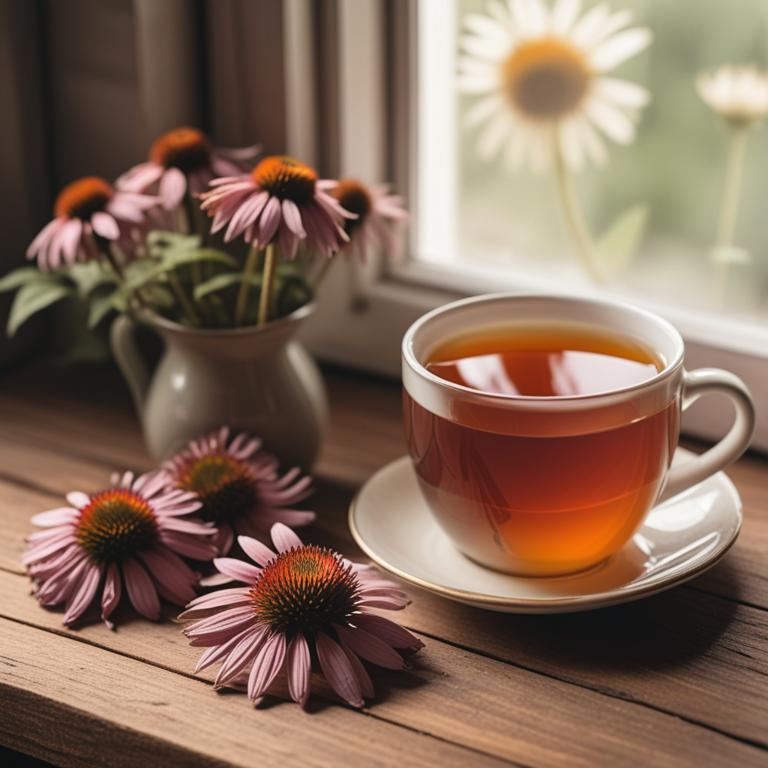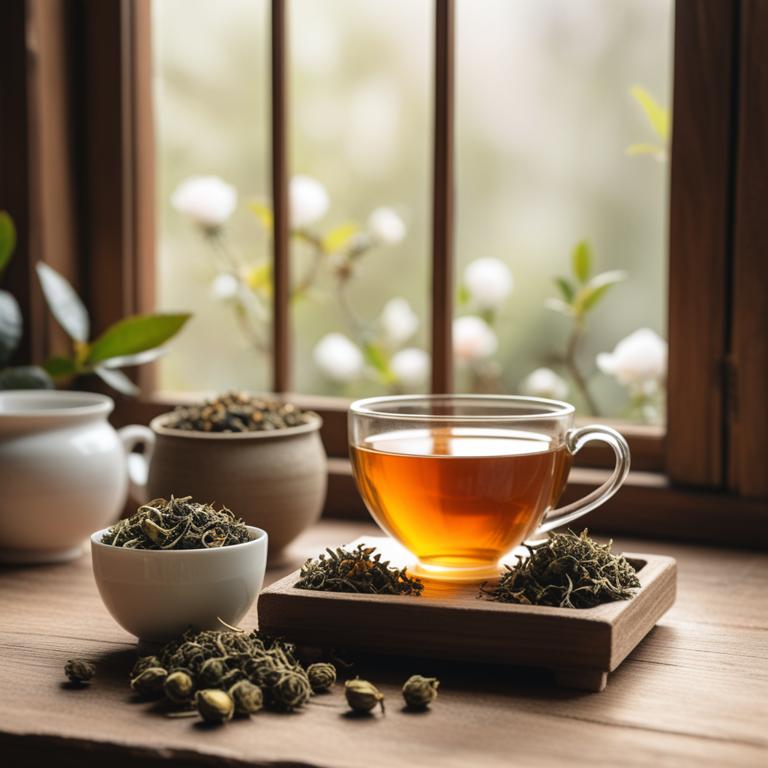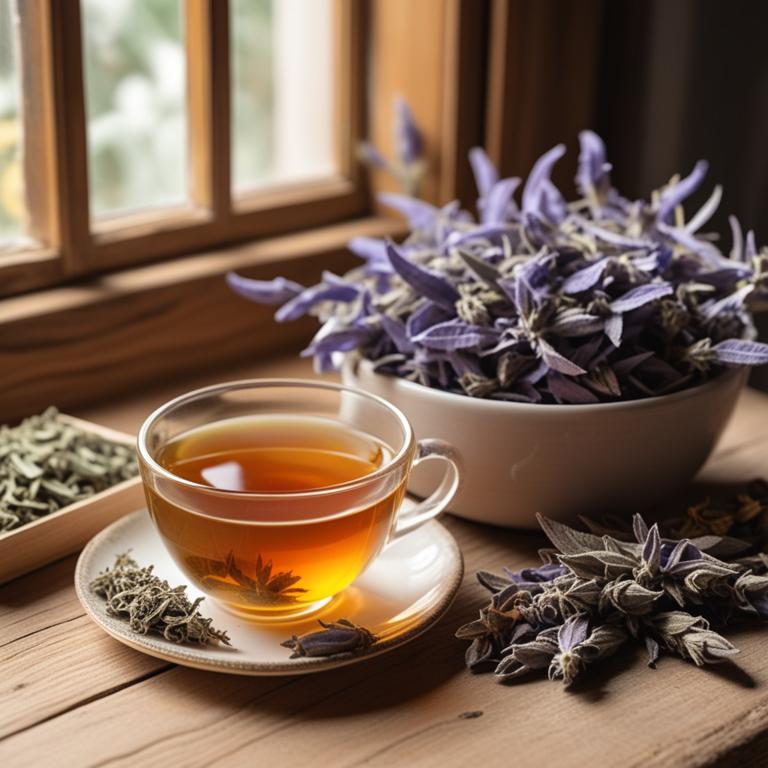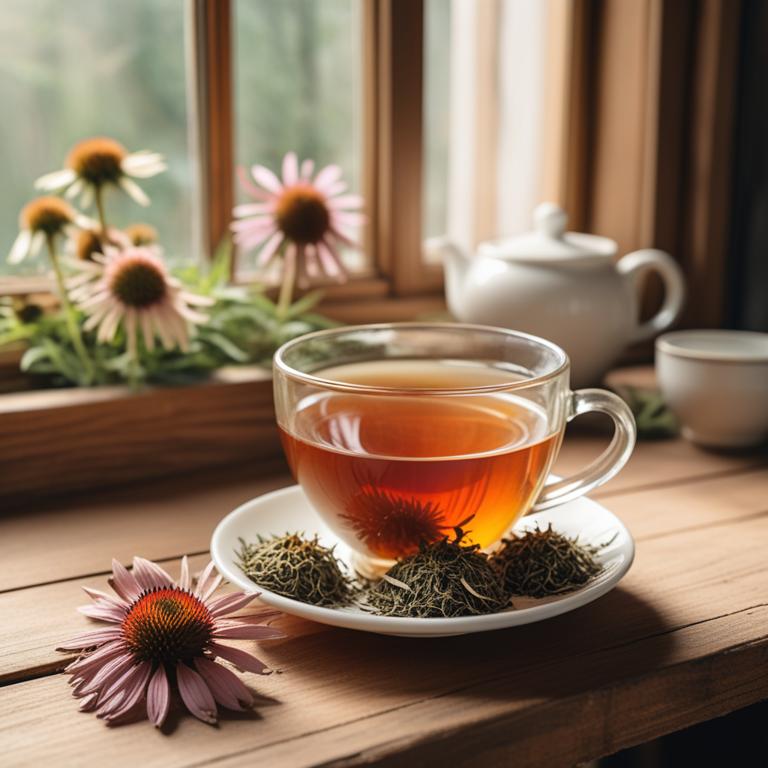11 Best Herbal Teas For Infection

Herbal teas for infection are a type of herbal remedy used to treat various types of infections, particularly those caused by bacterial, viral, or fungal pathogens.
These teas are made from a variety of herbs and plants that have been traditionally used for their antimicrobial, anti-inflammatory, and antioxidant properties, which help to alleviate symptoms and support the body's natural healing process.
Examples of herbal teas used to treat infections include peppermint tea, which helps to soothe and calm the digestive system; ginger tea, which has anti-inflammatory properties that reduce swelling and pain; echinacea tea, which boosts the immune system and fights off infection; sage tea, which has antimicrobial properties that help to combat bacterial and fungal infections; and yarrow tea, which reduces fever and alleviates symptoms of the common cold.
By incorporating these herbal teas into one's diet, individuals can potentially reduce their reliance on antibiotics and other medications, while also promoting overall health and well-being.
According to the European journal of translational myology, teas for infection, specifically green tea, have been shown to effectively improve diarrhea and reduce hospital stay in children suffering from viral gastroenteritis.
Below there's a list of the 11 best herbal teas for infection.
- 1. Echinacea purpurea teas
- 2. Camellia sinensis teas
- 3. Eucalyptus globulus teas
- 4. Salvia officinalis teas
- 5. Glycyrrhiza glabra teas
- 6. Cinchona officinalis teas
- 7. Echinacea angustifolia teas
- 8. Thymus vulgaris teas
- 9. Rosmarinus officinalis teas
- 10. Zingiber officinale teas
- 11. Ginkgo biloba teas
Also you may be interested in...
TODAY'S FREE BOUNDLE
Herb Drying Checklist + Herbal Tea Shopping List + Medicinal Herbs Flashcards
Enter you best email address below to receive this bundle (3 product valued $19.95) for FREE + exclusive access to The Aphotecary Letter.
$19.95 -> $0.00
1. Echinacea purpurea teas

Echinacea purpurea teas have been traditionally used to treat various infections, including respiratory and urinary tract infections, due to their anti-inflammatory and immunomodulatory properties.
The bioactive constituents present in this herbal preparation, such as alkylamides, caffeic acid derivatives, and glycosides, help to stimulate the immune system, reduce inflammation, and fight off pathogens.
By enhancing the body's natural defense mechanisms and reducing oxidative stress, Echinacea purpurea teas can help to alleviate symptoms and promote recovery from infections.
The benefits of using Echinacea purpurea teas to treat infections include reduced risk of complications, faster recovery time, and a lower chance of developing antibiotic-resistant strains of bacteria.
Related Study
According to the study, Echinacea purpurea teas may be beneficial for the early treatment of acute upper respiratory infections, with evidence from published trials suggesting generally positive results for the treatment of URIs.
2. Camellia sinensis teas

Camellia sinensis teas, a popular herbal preparation, have been used for centuries to treat various infections, including bacterial and fungal infections, due to their antimicrobial and anti-inflammatory properties.
The bioactive constituents, such as catechins, theaflavins, and thearubigins, in Camellia sinensis teas help to treat infections by inhibiting the growth of microorganisms and reducing inflammation.
This herbal preparation helps to treat infections by boosting the immune system, reducing oxidative stress, and promoting the production of white blood cells, which fight off invading pathogens.
The benefits of Camellia sinensis teas in treating infections include reduced risk of complications, faster recovery, and improved overall health, making them a valuable natural remedy for various infectious diseases.
Related Study
According to "Molecules (Basel, Switzerland)", Camellia sinensis teas for infection contain major polyphenols such as epigallocatechin-3-gallate (EGCG), which has been highlighted for its antimicrobial and antitumoral activity.
3. Eucalyptus globulus teas

Eucalyptus globulus teas have been used to treat respiratory infections due to their decongestant and anti-inflammatory properties.
The herbal preparation helps to treat this ailment by reducing mucus production, relieving congestion, and soothing the respiratory tract, ultimately providing relief from coughs and colds.
Eucalyptus globulus teas contain bioactive constituents such as eucalyptol, which is responsible for its decongestant and antimicrobial properties, helping to combat the underlying infection.
The benefits of using Eucalyptus globulus teas to treat respiratory infections include its natural and non-invasive approach, ease of use, and minimal side effects, making it a popular choice for those seeking alternative remedies.
Related Study
According to the study, Eucalyptus globulus teas may have some antimicrobial properties, specifically against oral pathogenic microorganisms, due to the presence of certain phloroglucinol--sesquiterpene-coupled constituents.
4. Salvia officinalis teas

Salvia officinalis teas have been used for centuries to treat various infections, including respiratory and gastrointestinal ailments, due to their antimicrobial and anti-inflammatory properties.
These herbal preparations help to treat infections by inhibiting the growth of pathogenic microorganisms, reducing inflammation, and modulating the immune system.
The bioactive constituents of Salvia officinalis, including flavonoids, phenolic acids, and terpenoids, exhibit antimicrobial and anti-inflammatory activities, contributing to their therapeutic effects.
The benefits of Salvia officinalis teas in treating infections include reduced symptoms, accelerated recovery, and improved overall health, making them a popular herbal remedy for this purpose.
Related Study
According to the study, Salvia officinalis teas for infection have shown to be effective against a range of microorganisms, including Staphylococcus aureus, Staphylococcus epidermidis, Streptococcus mutans, Candida albicans, Candida tropicalis, and Candida glabrata, with no cytotoxic effect observed.
5. Glycyrrhiza glabra teas

Glycyrrhiza glabra teas, also known as licorice root tea, have been used for centuries to treat various ailments, including infections.
The properties of this herbal preparation that help to treat infections include its anti-inflammatory, antimicrobial, and antiviral properties, which help to reduce inflammation, kill bacteria and viruses, and prevent the spread of infection.
The bioactive constituents of Glycyrrhiza glabra teas, such as glycyrrhizin and flavonoids, help to modulate the immune system, reduce oxidative stress, and promote the healing process, ultimately leading to the treatment of infections.
The benefits of using Glycyrrhiza glabra teas to treat infections include reduced symptoms, faster recovery, and enhanced overall health, making it a popular natural remedy for various infections.
Related Study
According to "Phytotherapy research : PTR", Glycyrrhiza glabra teas for infection showed activity against both yeast and filamentous fungi, particularly against drug resistant mutants of Candida albicans.
6. Cinchona officinalis teas

Cinchona officinalis teas have been traditionally used to treat malaria, a severe infection ailment caused by Plasmodium parasites.
The properties of this herbal preparation that help to treat this ailment include its antimalarial and anti-inflammatory properties, which help to reduce the severity of the disease.
The bioactive constituents of Cinchona officinalis, such as quinine, help to treat this ailment by inhibiting the growth and replication of the Plasmodium parasites.
The benefits of this herbal preparation include reducing fever, alleviating symptoms, and preventing the progression of the disease, making it a valuable natural remedy for treating malaria.
Related Study
According to "Molecules (Basel, Switzerland)", Cinchona officinalis teas for infection may be a potential alternative treatment option due to its tannin-rich properties, which have been shown to inhibit pathogens and exhibit anti-biofilm activity.
7. Echinacea angustifolia teas

Echinacea angustifolia teas have been traditionally used to treat infection-related ailments, and their properties make them a promising herbal preparation for this purpose.
The anti-inflammatory, antimicrobial, and immunomodulatory properties of Echinacea angustifolia teas help to treat infection by reducing inflammation, inhibiting the growth of pathogens, and modulating the immune system to combat infections more effectively.
The bioactive constituents of this herbal preparation, such as alkylamides, caffeic acid derivatives, and polyacetylenes, contribute to its infection-fighting properties by exhibiting antimicrobial and anti-inflammatory activities.
The benefits of using Echinacea angustifolia teas to treat infection-related ailments include reduced severity and duration of symptoms, improved immune function, and a lower risk of developing antibiotic-resistant infections.
Related Study
According to "The Journal of family practice", Echinacea angustifolia teas may be beneficial for the early treatment of acute upper respiratory infections such as those caused by infections.
8. Thymus vulgaris teas

Thymus vulgaris teas, also known as thyme tea, have been traditionally used to treat infections and respiratory ailments due to their antimicrobial and anti-inflammatory properties.
The bioactive constituents present in thyme tea, such as thymol and carvacrol, exhibit potent antimicrobial activity, helping to combat bacterial and fungal infections.
These constituents work together to reduce inflammation, alleviate congestion, and promote healing, making thyme tea an effective remedy for treating infections and respiratory issues.
The benefits of using thyme tea to treat infections include its ability to boost the immune system, reduce symptoms of illness, and promote overall well-being, making it a valuable herbal preparation for natural health remedies.
Related Study
According to "Wiadomosci lekarskie (Warsaw, Poland : 1960)", Thymus vulgaris teas for infection may have antimicrobial, anti-inflammatory, and immunomodulatory effects due to the presence of thymol, helping alleviate symptoms such as cough and dyspnea.
9. Rosmarinus officinalis teas

Rosmarinus officinalis teas, also known as rosemary tea, have been traditionally used to treat infection-related ailments due to their antimicrobial and anti-inflammatory properties.
The bioactive constituents, such as carnosic acid and rosmarinic acid, in this herbal preparation help to inhibit the growth of bacteria and fungi, reducing the severity of infections.
By reducing inflammation and promoting wound healing, rosemary tea can effectively treat infection-related ailments, making it a valuable natural remedy for various health issues.
The benefits of using rosemary tea to treat infections include its ability to boost the immune system, reduce oxidative stress, and promote overall well-being, making it a popular choice for those seeking natural and holistic approaches to health.
Related Study
According to "International journal of microbiology", Rosmarinus officinalis teas for infection showed antimicrobial activity against Escherichia coli urinary isolates, with an inhibitory zone of 8-23 mm and a minimum inhibitory concentration (MIC) between 12.5 and 50 mg/ml.
10. Zingiber officinale teas

Zingiber officinale teas, also known as ginger tea, have been used for centuries to treat various ailments, including infection.
The anti-inflammatory and antimicrobial properties of this herbal preparation help to treat infection by reducing inflammation and preventing the growth of microorganisms.
The bioactive constituents of ginger tea, such as gingerols and shogaols, are responsible for its therapeutic effects, which help to combat infection by inhibiting the production of pro-inflammatory enzymes and killing bacteria.
The benefits of using ginger tea to treat infection include reduced pain and discomfort, accelerated wound healing, and a lower risk of developing antibiotic-resistant bacteria.
Related Study
According to "Saudi journal of biological sciences", Zingiber officinale teas for infection may be effective in reducing the oocysts and total parasitic stages in mice infected with Eimeria papillata by about 50%.
11. Ginkgo biloba teas

Ginkgo biloba teas have been traditionally used to treat various infections, particularly urinary tract infections, due to their antimicrobial and anti-inflammatory properties.
The bioactive constituents of Ginkgo biloba, such as flavonoids, terpenoids, and bilobalide, help to combat bacterial infections by inhibiting the growth of pathogenic microorganisms and reducing inflammation.
By consuming Ginkgo biloba teas, individuals can potentially alleviate symptoms of urinary tract infections, including pain, burning sensations, and frequent urination.
The benefits of using Ginkgo biloba teas to treat infections include their natural and non-invasive approach, minimal side effects, and potential prevention of antibiotic resistance.